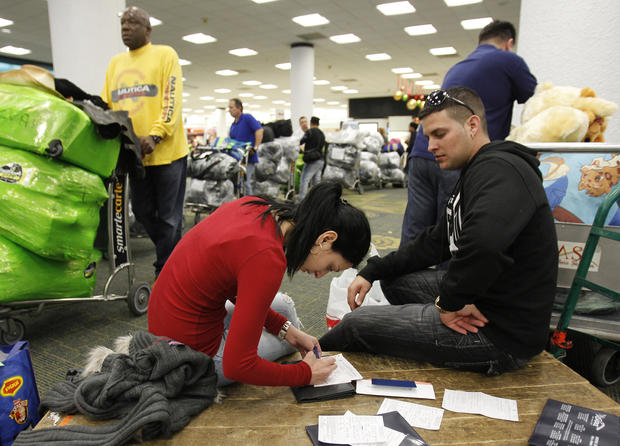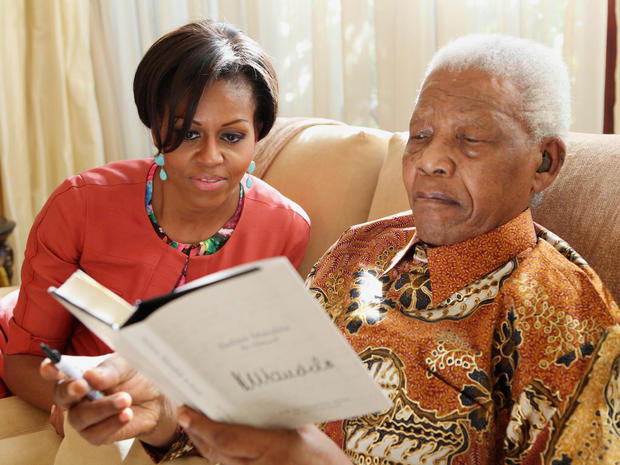Eyes of the world on Washington
From relative indifference, to attentiveness rivaling Americans' own interest in the presidential election, people around the world are waiting to see who will lead the United States for the next four years.
Issues ranging from defense alliances (old and new), the winding down of a U.S.-led war, and the rebuilding of the global economy weigh on the minds of foreign observers in different ways.
In the pages ahead, CBS News journalists from around the world share insight into how Election 2012 is playing in the countries they cover. Each page begins with a headline from a prominent newspaper in the relavent country. Click the "Next" button above to begin.
Cuba
"How are Obama and Romney doing?" - Juventud Rebelde ("Rebel Youth")
The Cuban media is largely ignoring the U.S. presidential race, but a visit to a Havana beauty salon offers a lesson in how closely Cubans are actually follow American politics. A manicurist's son lives in Miami. She's afraid a Romney victory would make it harder for him to come home for visits.
President Bush "only let our relatives visit once every three years," she says.
The roughly 400,000 visits by Cuban Americans this year have made a difference in the hard-scrabble lives of Cubans, and many islanders believe they would end if a Republican won the White House.
The owner of a private restaurant near the beaches east of Havana counts on his cousins in Florida to bring down herbs and spices, tableware and even rum produced in Puerto Rico. "The goods they bring us make us stand out from the competition," says the publicity-shy restaurateur. He's another budding entrepreneur hoping for an Obama victory.
Americans who come to Cuba for the people-to-people visits opened up by President Obama are probed for inside information on who will win Ohio or Pennsylvania by election-savvy "Havanatur" guides and hotel employees working with them.
Gustavo, Raul, Susana and other low-paid state employees have their fingers crossed for an Obama victory -- which they believe would help keep the high-tipping Americans coming south.
The Cuban government, on the other hand, has used the final days of the campaign to lambaste the Obama administration for training "mercenaries" in the nefarious use of the internet to undermine the Castro family's rule.
From Portia Siegelbaum, in Havana
United Kingdom
"On Souls to the Polls day, Black America clings to faith in Obama" - The Guardian
"There isn't the buzz of 2008," said a BBC presenter Monday morning. That sums up the distinctly diminished command of British attention that Election 2012 has enjoyed in Britain. This cousin of nations "across the pond" was swept up in Obamamania in 2008, but in the four years since, many have lost their zeal for American politics.
As the BBC anchorwoman put it, "he is now a known quantity."
That said, the big newspapers and television networks are all promising extensive coverage and analysis on Election Day, and with such an extensive economic, cultural and military alliance at stake, Britons, at least in the corridors of power, will take note.
From Tucker Reals, in London
France
"Everything still hangs in the balance on eve of vote" - Le Figaro
The French have long been fascinated by the U.S. and have followed this race closely, with a clear preference for President Obama. Much of the recent media coverage has spoken of the need for more bipartisanship in the U.S. Congress so that things can actually get done.
A lot of attention has also been paid to the economy, with growing pressure in France and Europe for an end to the tough austerity measures on both sides of the Atlantic.
All of the French newspapers had several-page specials on Monday, and the newsmagazines (which come out Thursday) had them last week, and they will no doubt have them again in four days.
From Elaine Cobbe, in Paris
Italy
"A tie would be a nightmare" - La Repubblica
Italy's center-right is for Mitt Romney, the center-left is for President Obama, but in this nation mired in economic malaise, the big banks have pinned their hopes on the incumbent.
The other prevailing theme in news coverage here is the prospect of non-decisive results on Wednesday morning.
In the article Monday by La Repubblica, the reporter says there's "a faceless third man who could win this competition... His name is No-one." With Italy's financial crisis so close to the front of peoples' minds here, it's little wonder the thought of a power struggle in the world's biggest economy is a cause for concern.
Many Italians say both candidates seem to have avoided any real mention of Europe, and seem only cursorily bothered by the European Union's debt crisis. There's a sentiment that America is no longer interested in playing the role of moral guide for the democratic West. The relationship with European democracies is no longer a strategic priority, it seems. America's relationship with Asia is now more important.
From Costanza Barone, in Rome
Israel
"Obama, Romney to make their final case on last day of race" - Yediot Ahronot
Israelis are closely watching the U.S. elections because whoever comes to power in Washington will have great influence on the turbulent Middle East. And as a possible war with Iran looms as early as next summer, the election is seen as pivotal.
In fact, a record 80,000 Americans living in Israel have cast absentee ballots. Against the background of U.S.-Israel tensions during the past four years over Jewish settlement expansion and Iran, a poll shows that 85 percent of Americans in Israel voted for Mitt Romney compared to just 14 percent for President Obama. Overall, polls show that a strong majority of the Israeli public believes that Romney would be more sympathetic to Israel than Mr. Obama.
"Obama, Romney to make their final case on last day of race," reads a headline in Israel's biggest newspaper, Yediot Ahronot. A headline in The Jerusalem Post said, "Candidates sprint across US as race nears end."
Palestinians are largely apathetic about the elections. They say whoever is elected will continue America's pro-Israel policy and will not look out for the interests of the Palestinian people.
From Robert Berger, in Jerusalem
Afghanistan
"U.S. election process is badly broken" - Kabul Times
Afghans are watching the election closely. One of the national news stations airs mini-biographies of President Obama and Mitt Romney every half hour. Here, the year 2014 is on everyone's mind: what will happen when NATO's mission ends and will the U.S. stay, despite both candidates vowing to end the war?
Some Afghans we spoke with want the U.S. to stay longer. They also want America to put more pressure on Pakistan to reign in the Islamic militants in the border region. Fared Rastagar, a well-known singer and composer here, told us he would like to see Romney win, because he thinks Romney will be stronger on Pakistan. Farhad Latif, a 24-year-old tech entrepreneur prefers Mr. Obama, though he admits he's one of the few who follows tech news instead of politics.
A headline in the English language "Kabul Times," meanwhile, somewhat ironically proclaimed that the U.S. election process was "badly broken," because both campaigns have already hired armies of lawyers to wrangle over voters' access to polling stations and vote counting. This, in a country where the last parliamentary elections in 2010 were completely discredited by vote buying, ballot box stuffing and the arrest of election officials.
From Kelly Cobiella, in Kabul
Pakistan
"Race to the finish line - Romney, Obama in swing states" - DAWN
Many Pakistanis view the close contest for the White house with familiarity - elections here are generally fraught and uncertain affairs until the final outcome is revealed.
Some worry about the prospect of an unclear result after Tuesday's voting -- a repeat of 2000 -- as the world continues to face challenges from a weak economy to the winding down of the U.S.-led war in neighboring Afghanistan.
"If you have an indecisive outcome or there is a U.S. president who looks weak, opponents of the U.S. like the Taliban will feel they have gathered strength," Islamabad resident Nida Jabeen told CBS News.
But many Pakistanis remain indifferent. Anti-U.S. sentiment in the general population here is widespread, as attacks by U.S. drone aircraft on alleged militants continue to stoke anger.
"Nothing will change for Pakistan. We will still have drone attacks targeting our innocent people," Naeem ul Haq, a college student in Islamabad, told CBS News.
From Farhan Bokhari, in Islamabad
China
"China-bashing ad takes voters for a ride" - China Daily
Some in Beijing view China's prominence in this year's U.S. presidential race as confirmation of their country's rise in global power. Neither President Obama nor Mitt Romney have won many fans in the country with their harsh campaign rhetoric.
Obama's announcement earlier this year of a "pivot to Asia" in foreign policy, which will include increased U.S. military presence in the Asia Pacific, is viewed warily by some, who see it as an attempt to contain China's growing regional power. But Romney has threatened to label the country a currency manipulator on his first day in office.
In September, China's state run news agency said Romney's anti-Chinese rhetoric could trigger a trade war and damage the global economic recovery if he was elected. The article went on to say "the economic interests of the world's top two economies are far too intertwined for these economic powers to handle a break-up."
A break-up is exactly what some Chinese experts fear.
From Shannon Van Sant, in Beijing
Philippines
"Obama takes early lead: Romney hopes to erase gap" - The Philippine Star
The Philippines has been one of the United States' strongest allies in the Asia-Pacific region, and with increasing military support from the U.S., it has become an important platform for President Obama's "pivot to Asia."
With a rising China becoming more assertive on the world stage, Filipinos are watching the U.S. election closely and wondering whether America's role in the region is about to change course. So far, however, there's little indication, if any, that Romney would take a dramatically different approach.
The U.S. also remains the Philippines' biggest trading partner, and American investors are leading the growth of the call center industry here. Republican Doyle Stout, who represents the expat campaign group Republicans Abroad Philippines, says the Philippines' call center industry could grow even bigger under a Romney presidency, as he believes Republicans favor outsourcing.
From Barnaby Lo, in Manila
South Africa
"Why Obama?" - City Press
There is no doubt that if President Obama was running here, he'd be the hands down winner. An impromptu survey on a downtown Johannesburg street suggests he would take it in a clean sweep.
"Obama has roots in Kenya. He is an African man, and as such he knows how to lead," said Sipho Mokoena.
Most national newspapers in South Africa make no mention on their front pages of the election in the U.S.
"This election is about the U.S. economy," said Johannesberg resident Ntathi Radebe. "It is really about their domestic issues."
For student Ayanda Ntshobodi, other news from America was of greater interest.
"I am much more interested in the storm than I am in the U.S. election. We have been watching from our varsity dorm each night. The election is a little dull, does it really matter? How will it change my life? It won't."
From Sarah Carter, in Johannesburg










